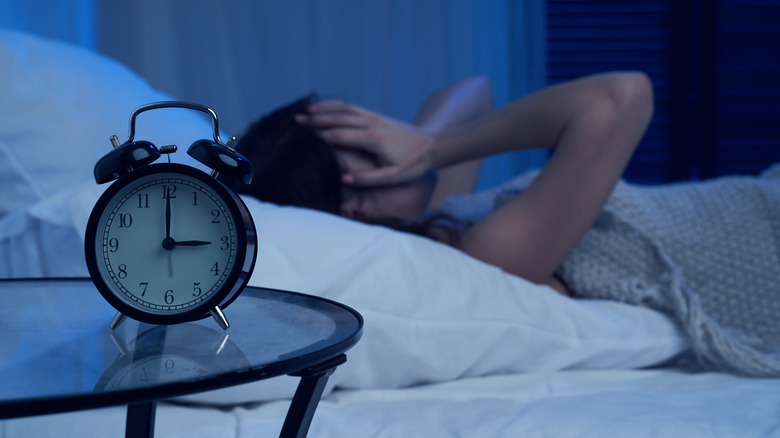How To Navigate The Mental And Physical Effects Of Daylight Saving Time
On Sunday, November 6, daylight saving time came to an end once again, which means the nights feel longer, the sun sets before 5 p.m., and the clock on your microwave has probably been wrong for a few days now. The Sunshine Protection Act passed by the Senate promised to put an end to the constant clock shifting, but it has yet to be put into effect, leaving us to "spring forward and fall back" each year.
Daylight saving was once implemented to save energy and provide more sunlight during working hours for Americans during World War I, per CNN. But times have changed, and now the shift from daylight saving time is mostly a hassle as Americans have to adjust their circadian rhythm to a time change every six months. Studies have found that this shift actually has negative effects on people's physical and mental health, causing poor sleep, memory issues, and even an increased level of seasonal depression (via Self).
If you've been feeling down since the time change, you aren't alone. Luckily, there are ways to keep your mind and body healthy for those of us who feel like daylight saving time gets tougher each year.
If you or someone you know needs help with mental health, please contact the Crisis Text Line by texting HOME to 741741, call the National Alliance on Mental Illness helpline at 1-800-950-NAMI (6264), or visit the National Institute of Mental Health website.
Fight off the winter blues with these tips
Good news for those who are feeling less than energized since daylight saving time ended. Self tells us that "the health effects of daylight saving are usually short-lived and most people will be able to bounce back within a few days." It may be tempting to cozy up and take a long mid-afternoon nap when it's dark and cold outside, but sticking to your regular routine to avoid further disruption to your sleep cycle.
Studies have shown that a little bit of sunshine will keep your vitamin D levels boosted, helping to regulate your mood and your immune system. Try taking a walk in the morning or dining outside whenever the weather permits to catch some rays.
If you are still feeling unmotivated, exhausted, or depressed for a prolonged period after daylight saving time has ended, it may indicate seasonal depression. The American Academy of Family Physicians reports that up to 6% of Americans are affected by seasonal depression each year. As the winter approaches, you may have fewer opportunities for natural sunlight; a sunshine lamp is a great investment to keep your routine regular and combat seasonal depression.
If you are feeling especially bogged down this season, Everyday Health recommends prioritizing social interactions and getting routine physical exercise. Dawn simulators, vitamin D supplements, and even aromatherapy have all been proven to ease the effects of seasonal depression, as well.
If you are experiencing symptoms of seasonal depression, talk to your doctor for further guidance.

